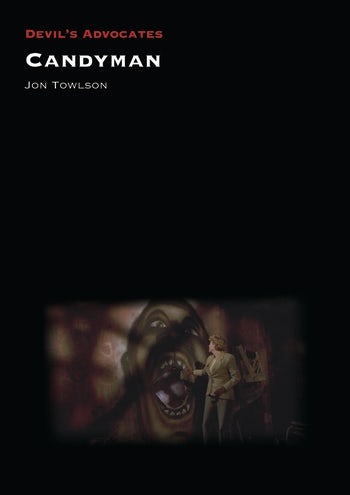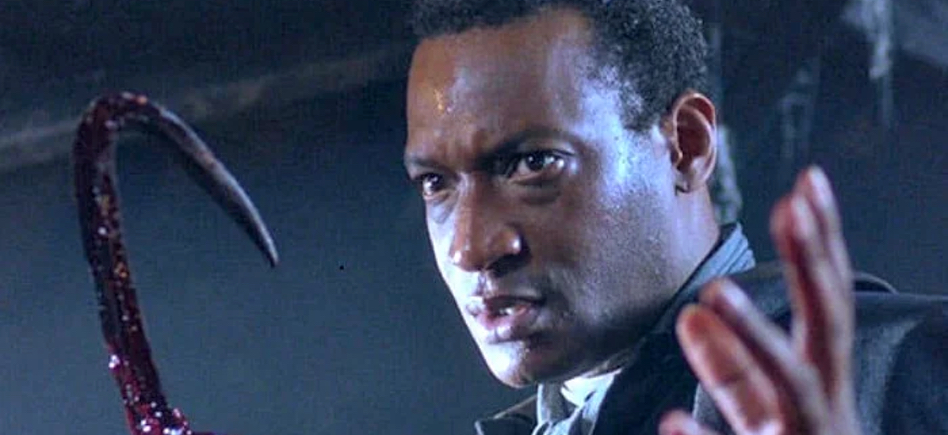“Candyman suggests that oral storytelling and, by extension, urban legends are valuable forms of historical memory, and that the process of historical amnesia will be apocalyptic” – Kirsten Moana Thompson, 2007

In 1992 director Bernard Rose released his movie Candyman, loosely based on Clive Barker’s short story The Forbidden, it would go on to become a popular shocker, but there was much more to Candyman than a mere horror film. The film has several different narrative threads running through it, that deal with issues of race, gender and class.
The key protagonist in the story is Helen Lyle, played by Virginia Madsen, a graduate student undertaking research on the topic of urban legends, she visits the Cabrini-Green housing projects to investigate rumours of a hook handed killer known as the Candyman, who was alleged to have been lynched in the late 19th century after fathering a child with a white land owners daughter. With the help of resident Anne-Marie McCoy (Vanessa Williams) and a young boy called Jake, Helen was able to uncover the apartment where the Candyman killings are alleged to have taken place. Helen is later attacked by a drug dealer who is using the Candyman persona to spread fear among the residents.
Helen is eventually visited by the real Candyman, played by Tony Todd, who places her in a trance. Upon waking she finds herself in Anne-Marie’s apartment, covered in blood, and is duly arrested for the abduction and possible murder of Anne-Marie’s baby son, Anthony. Helen must go out of her way to clear her name, stop the Candyman and attempt to save baby Anthony. I won’t go into any further details for those who may not have seen the film, but it is highly recommended if you want a little more from your horror movies than just blood, guts and gore.

Devil’s Advocates is a new and ongoing series of monographs from Auteur publishing, concerned with the exploration of the classics of horror cinema, other entries in the series that may be of interest to revivalists include Witchfinder General, Black Sunday and The Texas Chainsaw Massacre. Contributors to the series are drawn from the spheres of education, academia, journalism and literature, but what they each share is a proclivity towards the horror movie.
Candyman is written by Jon Towlson, film critic and author of several classic books on horror cinema including both “Subversive Horror Cinema: Countercultural Messages of Films from Frankenstein to the Present” and “The Turn to Gruesomeness in American Horror Films”. Candyman is his first entry in the Devil’s Advocates series and I would like to think more will surely follow.
There is a great deal of information to unpack and evaluate from Candyman, one of the few films of its era to subvert the genre, and to ask more important socio-political questions about race, gender and class than most of its contemporaries. Towlson manages to handle this in a most assured fashion. His book is insightful, thoroughly researched and written in a readable and yet academic style. The section looking at the Candyman and the Return of the Repressed really gets to the crux of the film’s ideas but it also draws our attention to the different meanings that can be read into the film’s narratives, thus allowing the reader a chance to formulate their own opinions on the issues at play. One thing that is drawn out from all of this is the affinity between the Candyman and Helen, Towlson makes clear that this is at the heart of the film. He calls it a sympathetic indentification between the two. Both are framed as slave and victim, and both are exploited by the capitalist structures of white patriarchy.

The section of the book dealing with urban legends is also of particular interest to revivalists, especially those with an interest in the Urban Wyrd. Towlson digs into those urban legends that were the inspiration for the Candyman character and how both Bernard Rose and Clive Barker were responsible for bringing those urban legends to the table in the creation and development of the film and the character of the Candyman. This returns us to the quote at the top of this review from Kirsten Moana Thompson about the validity of oral storytelling and urban legends as valuable forms of historical memory. Bernard Rose uses those myths or urban legends to engage us with those deeper problems of race, gender and class that pepper the film’s narrative.
The book also looks at how Bernard Rose took Barker’s short story and developed it for cinema, and how it was received by the mainstream media and horror fans alike. There is also a chapter dedicated to the sequels and some of the other films to have dealt with urban legends in the wake of Candyman’s success. I feel it also worth noting that there is a fascinating and informative interview that Towlson conducted with Bernard Rose in 2016 included as an added bonus.
Candyman by Jon Towlson is available to purchase from Amazon priced at £9.99